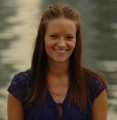It was day seven. Day seven of the heat. Day seven of no air conditioning. Day seven of constant sweating, of feeling the sticky liquid between my breasts. Seven days of no wind. Seven days of inhaling the sour stench of chicken shit and burning trash. The night gave me the gift of seven more mosquito bites. The tradeoff for leaving the window open to allow the cooler night air to sooth my burning skin. There are no screens here. There are no fans. There is no ice, no freezer. I am trapped in an endless inferno.
I started the mile walk to the center, a crumbling building with metal bars covering the windows, where I was teaching Roma children English. My feet were swollen, pushing against the straps of my sandals. I walked past my neighbor’s house and heard the shrill scream of a pig being slaughtered, high pitched like a woman in agony. I walked past the soldier’s barracks and caught the glint of a scythe in the early morning sun. A young soldier, dressed in camouflage pants, heavy black boots, and a black t-shirt, swung the scythe over his head, sending a shower of grass into the air as the blade severed each stalk. He stopped and wiped the sweat glistening on his forehead. I watched him for a moment and when our eyes met, he whistled and yelled an inaudible sentence. I looked back down and picked up my pace.
In the alley that cut off from the main road, I ran my hands along the tall cement walls. Someone had spray-painted a crude Croatian flag on one side and underneath it, scrawled in English, were three simple words: “Serbs are shit.â€Â Three words that fueled a bloodbath.
When I arrived at the center, the Roma children were restless, leaning against the center door and shading their eyes from the sun. They wreaked of sweat, collected from days of not bathing and their mocha skin shimmered with moisture. “Dobar dan,†I greeted them. I unlocked the front door and a gust of stale, moldy air flooded my nostrils. The younger children clamored into the one room building and pushed past me to the sporadic array of plastic chairs. The older ones lingered outside the door, snubbing out their cigarettes with calm, careful coolness, before entering.
Over the whir of Croatian conversations, I made my first attempt to gain their attention. “Molim sjedne.â€Â But half of them remained standing. I said it again, and they looked at me, and shuffled to find an open seat. I started my lesson, but I could feel the energy begin to bunch and expand, ready to snap. And then, it did. It exploded.
Boris, a skinny five year old, with an adult strut and fuzzy black hair, crossed his arms, slouched down in his chair, and shouted, “Fuck,†one of the only English words he knew. He smiled and his dimples pinched his skinny cheeks. The other children laughed and his smile grew. I looked at him, shook my head. “Tisina,†I said, but he was not ready to be quiet. The other children were feeding on his energy and their voices grew louder, gaining momentum, and I felt my control begin to slip.
Within minutes, chaos erupted. Boris and Boyan, another rambunctious five year old dressed in heavy sweatpants and a sweatshirt, began boxing each other. Their tiny fists jabbed at each other’s eyes and cheeks and every once in a while, one skinny leg would lash out and kick another.  I pulled them apart. “Dosta,†I shouted.
I turned around and the room was full of children flipping each other off and tongues sticking out between tiny little lips. I looked up and saw Dejan, a heavy set boy with only two teeth and a tendency to discipline the other children, cock his fist back and punch Bojana in the face. I grabbed him, pushed him out the front door and felt the limits of language suffocate me. “You just hit a girl,†I said in disbelief. “Go home.â€Â But he looked at me and could not understand the words that had come out of my mouth. I shut the door and turned to face the room. Out of the corner of my eye, I saw Dejan, open the door and sneak past me.
I was helpless. I could not speak their language. I could not convey my anger. I could not force them to listen to me, they did not understand my words. I had lost control.
I looked around. The heat made me dizzy and weak. Two children were sitting at a table, hands over their ears, trying to block out the screaming of the others. I felt like joining them.
But, I was saved. I was saved by a squat, balding man in blue track shorts, named Dusko. His bulging brown eyes appeared to be attempting an escape from their sockets as he opened his mouth to allow a tirade of shouts tumble out. The children froze. He raised his shirt up and rested it on top of his protruding belly, began rubbing the sweat into the short curly hairs that covered his skin, and continued to yell. I watched him. He had a snake in his mouth and I watched its pink skin dart between his plump lips, forming foreign words. I listened, but I could not understand him. The children were silent. I heard a tiny sob escape from Jasmina’s mouth and when I looked at her, I saw her tears staining her cheeks.
Dusko’s words were acidic, corroding the hearts of these delicate children. I wanted him to stop. I was silent. I could not find my voice and Dusko’s words were washing over all of us, drowning us. It ended and the children shuffled out into the heat, heads bowed. I could not look at them. I followed them out into the thick air and wandered home.

